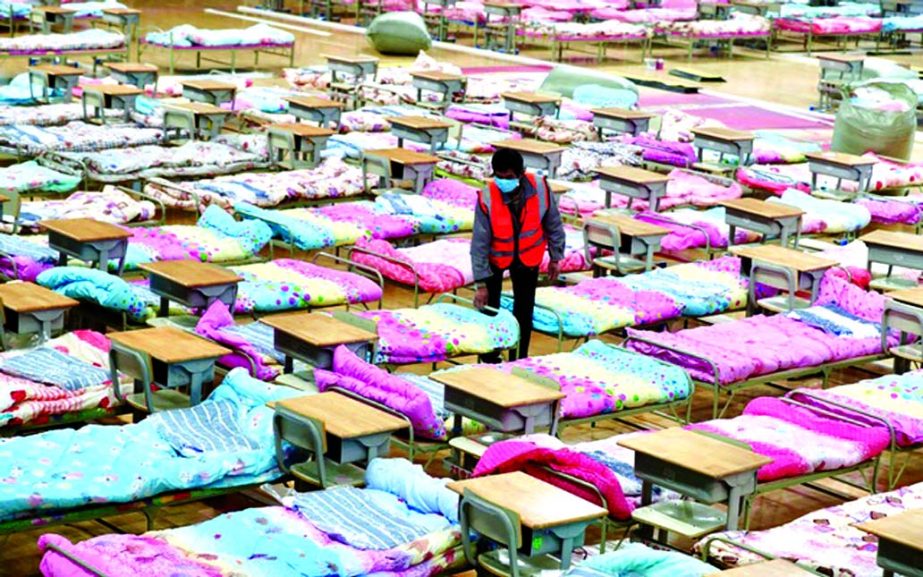
BBC Online :
China’s top leadership has admitted “shortcomings and deficiencies” in the country’s response to the deadly coronavirus outbreak.
The rare admission came from the Politburo Standing Committee, which called for an improvement in China’s emergency management system.
It also ordered a “severe” crackdown on illegal wildlife markets – where the virus is thought to have emerged.
The death toll has risen to 427, with more than 20,000 confirmed cases.
“In response to the shortcomings and deficiencies… we must improve our national emergency management system and improve our abilities in handling urgent and dangerous tasks,” the report said. “It is necessary to strengthen market supervision, resolutely ban and severely crack down on illegal wildlife markets and trade.”
The government’s initial handling of the outbreak has been widely criticised.
Officials have been accused of downplaying the severity of the virus at the start of the outbreak and in some cases, attempting to keep news of it secret.
One doctor in Wuhan who tried to warn his fellow colleagues about the outbreak late last year was accused of “making false comments” and told by police to stop the “illegal activity”.
It was only later in January that the government ordered the virtual lockdown of Hubei province, where the virus is believed to have originated.
Other regions close to the mainland are also feeling the effects of the virus first-hand. On Tuesday, Hong Kong confirmed its first death from the coronavirus. Broadcaster RTHK said the 39-year-old man, who suffered from an underlying illness, had visited Wuhan on 21 January.
Hong Kong, which has 15 confirmed cases, has suspended 10 out of 13 border crossings with mainland China.
Taiwan announced that starting Friday, it would deny entry to all foreign nationals who have been to mainland China in the past 14 days.
Macau – one of Asia’s biggest gambling hubs – also announced that it would temporarily close down all the casinos in the region.
The closure is set to last two weeks but could be extended.
The new coronavirus causes severe acute respiratory infection and symptoms usually start with a fever, followed by a dry cough.
The number of deaths in China, excluding Hong Kong, now exceeds the 349 killed on the mainland in the Severe Acute Respiratory Syndrome (Sars) outbreak of 2002-03.
But the mortality rate of the new virus is about 2.1% – much lower than that of Sars at around 9.6% – suggesting it is not as deadly. There are more than 150 cases in other countries, with one death in the Philippines. On Tuesday, South Korea announced that one of its citizens had tested positive for coronavirus after visiting Thailand.
China’s top leadership has admitted “shortcomings and deficiencies” in the country’s response to the deadly coronavirus outbreak.
The rare admission came from the Politburo Standing Committee, which called for an improvement in China’s emergency management system.
It also ordered a “severe” crackdown on illegal wildlife markets – where the virus is thought to have emerged.
The death toll has risen to 427, with more than 20,000 confirmed cases.
“In response to the shortcomings and deficiencies… we must improve our national emergency management system and improve our abilities in handling urgent and dangerous tasks,” the report said. “It is necessary to strengthen market supervision, resolutely ban and severely crack down on illegal wildlife markets and trade.”
The government’s initial handling of the outbreak has been widely criticised.
Officials have been accused of downplaying the severity of the virus at the start of the outbreak and in some cases, attempting to keep news of it secret.
One doctor in Wuhan who tried to warn his fellow colleagues about the outbreak late last year was accused of “making false comments” and told by police to stop the “illegal activity”.
It was only later in January that the government ordered the virtual lockdown of Hubei province, where the virus is believed to have originated.
Other regions close to the mainland are also feeling the effects of the virus first-hand. On Tuesday, Hong Kong confirmed its first death from the coronavirus. Broadcaster RTHK said the 39-year-old man, who suffered from an underlying illness, had visited Wuhan on 21 January.
Hong Kong, which has 15 confirmed cases, has suspended 10 out of 13 border crossings with mainland China.
Taiwan announced that starting Friday, it would deny entry to all foreign nationals who have been to mainland China in the past 14 days.
Macau – one of Asia’s biggest gambling hubs – also announced that it would temporarily close down all the casinos in the region.
The closure is set to last two weeks but could be extended.
The new coronavirus causes severe acute respiratory infection and symptoms usually start with a fever, followed by a dry cough.
The number of deaths in China, excluding Hong Kong, now exceeds the 349 killed on the mainland in the Severe Acute Respiratory Syndrome (Sars) outbreak of 2002-03.
But the mortality rate of the new virus is about 2.1% – much lower than that of Sars at around 9.6% – suggesting it is not as deadly. There are more than 150 cases in other countries, with one death in the Philippines. On Tuesday, South Korea announced that one of its citizens had tested positive for coronavirus after visiting Thailand.

